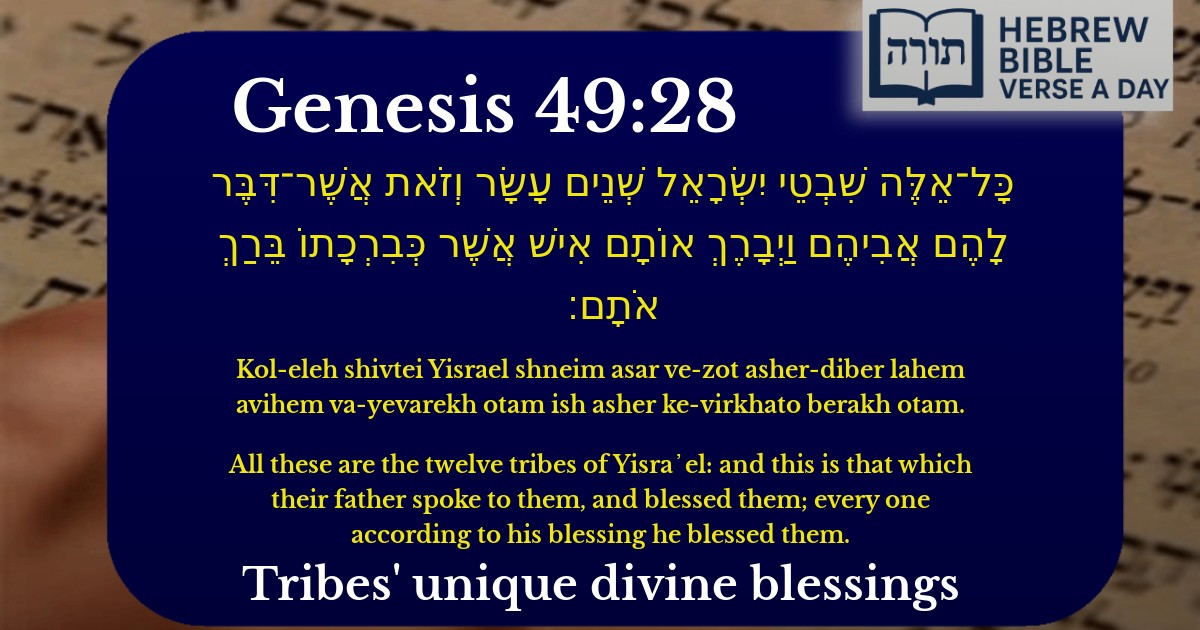Join Our Newsletter To Be Informed When New Videos Are Posted
Join the thousands of fellow Studends who rely on our videos to learn how to read the bible in Hebrew for free!
Hebrew Text
כָּל־אֵלֶּה שִׁבְטֵי יִשְׂרָאֵל שְׁנֵים עָשָׂר וְזֹאת אֲשֶׁר־דִּבֶּר לָהֶם אֲבִיהֶם וַיְבָרֶךְ אוֹתָם אִישׁ אֲשֶׁר כְּבִרְכָתוֹ בֵּרַךְ אֹתָם׃
English Translation
All these are the twelve tribes of Yisra᾽el: and this is that which their father spoke to them, and blessed them; every one according to his blessing he blessed them.
Transliteration
Kol-eleh shivtei Yisrael shneim asar ve-zot asher-diber lahem avihem va-yevarekh otam ish asher ke-virkhato berakh otam.
Hebrew Leining Text
כׇּל־אֵ֛לֶּה שִׁבְטֵ֥י יִשְׂרָאֵ֖ל שְׁנֵ֣ים עָשָׂ֑ר וְ֠זֹ֠את אֲשֶׁר־דִּבֶּ֨ר לָהֶ֤ם אֲבִיהֶם֙ וַיְבָ֣רֶךְ אוֹתָ֔ם אִ֛ישׁ אֲשֶׁ֥ר כְּבִרְכָת֖וֹ בֵּרַ֥ךְ אֹתָֽם׃
כׇּל־אֵ֛לֶּה שִׁבְטֵ֥י יִשְׂרָאֵ֖ל שְׁנֵ֣ים עָשָׂ֑ר וְ֠זֹ֠את אֲשֶׁר־דִּבֶּ֨ר לָהֶ֤ם אֲבִיהֶם֙ וַיְבָ֣רֶךְ אוֹתָ֔ם אִ֛ישׁ אֲשֶׁ֥ר כְּבִרְכָת֖וֹ בֵּרַ֥ךְ אֹתָֽם׃
🎵 Listen to leining
Parasha Commentary
📚 Talmud Citations
This verse is quoted in the Talmud.
📖 Megillah 16b
The verse is referenced in the context of discussing the blessings given by Jacob to his sons, the twelve tribes of Israel, and how these blessings are significant in Jewish tradition.
📖 Sotah 36b
The verse is mentioned in relation to the discussion of the tribes of Israel and their respective blessings, highlighting the unity and diversity among the tribes.


The Twelve Tribes and Their Individual Blessings
The verse (Bereishit 49:28) states: "All these are the twelve tribes of Yisrael, and this is what their father spoke to them and blessed them; each according to his blessing, he blessed them." This summation of Yaakov Avinu's blessings to his sons highlights the unique spiritual qualities of each tribe, as expounded by our Sages.
Rashi's Explanation
Rashi comments that Yaakov blessed each son "according to his blessing"—meaning he tailored his words to the individual nature and future role of each tribe. For example:
Rashi emphasizes that these were not mere personal blessings but prophetic declarations about the future roles of each tribe within Klal Yisrael.
Rambam's Perspective
In Moreh Nevuchim (3:50), Rambam explains that Yaakov's blessings contained both immediate personal guidance and long-term national prophecies. Each blessing was carefully formulated to guide the tribe in fulfilling its unique mission in serving Hashem.
Midrashic Insights
The Midrash (Bereishit Rabbah 98:3) teaches that when the verse states "he blessed them" (in the plural), it indicates that after giving individual blessings, Yaakov also gave a collective blessing to all the tribes together, uniting them as one nation.
The Sforno's Commentary
Sforno notes that the phrase "each according to his blessing" teaches that while the blessings differed, each was perfectly suited to help that tribe achieve its divinely ordained purpose. No blessing was superior—rather, each was essential for the complete tapestry of Am Yisrael.
Practical Lessons